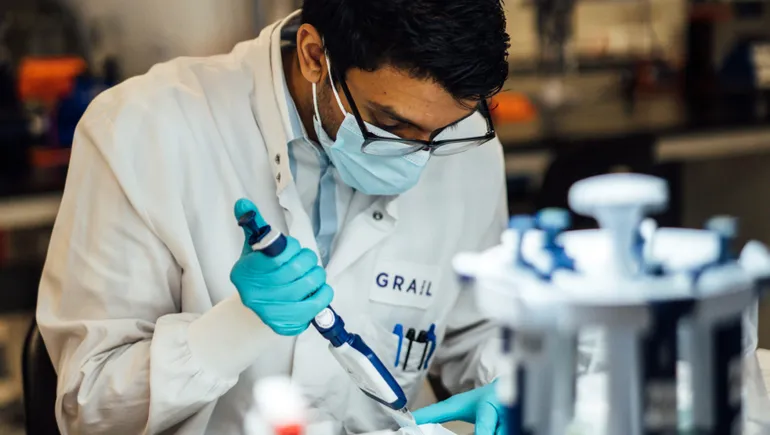Dive Brief:
- Illumina’s board of directors has approved the spinoff of Grail, targeting June 24 as the date the cancer blood test maker will regain its independence.
- Illumina agreed to divest the business it bought for $8 billion in 2021 after facing pressure from U.S and European antitrust regulators and activist investor Carl Icahn. Illumina, which announced the approval Monday, will keep a 14.5% minority stake in Grail.
- Leerink Partners analyst Puneet Souda said multi-cancer early detection tests like Grail’s Galleri, which is not approved by the Food and Drug Administration, have an uncertain future, and the divestment will allow Illumina to focus on its core business. “After the spinoff, we believe [Grail] will remain a cautionary tale in diagnostics for years to come,” wrote Souda.
Dive Insight:
Illumina, a genomics pioneer based in San Diego, first spun off Grail in 2016 with the ambitious goal of reducing global cancer mortality through a screening test to detect multiple cancers from a standard blood draw. Illumina repurchased the company five years later, aiming to speed adoption of the liquid biopsy test.
The unusual move — before either the European Commission or Federal Trade Commission had concluded reviews of the transaction — ran afoul of regulators from the start and brought orders to unwind the Grail acquisition.
The EU was concerned that Illumina’s control of Grail would stifle the development of rival blood-based early cancer detection tests, and ultimately fined the company a record 432 million euros for jumping the gun to complete the acquisition before securing antitrust approval.
Illumina was also forced to contend with a proxy challenge from Icahn, who argued Grail was draining the company’s finances and backed a divestiture. Shareholders voted out company Chairman John Thompson, and CEO Francis deSouza resigned weeks later.
Now, Grail is set to become an independent company once again.
“As we prepare to lead the next era of genomics innovation, we believe [Grail] will play an important role in advancing the industry and improving human health,” Illumina CEO Jacob Thaysen said in a statement.
Leerink’s Souda, however, cautioned that the outlook for multi-cancer detection tests is uncertain without Medicare support to pay for them. The analyst said Grail expects a $250 million cash burn in the second half of 2024, giving the company a two-year cash runway. Illumina will provide $775 million in funds as part of the separation, the analyst noted.
“It’s hard to say if [Grail] will find investors willing to fund its R&D and commercial operations,” Souda wrote. “It’s also important to note that Galleri is not FDA approved, and the growth outlook for any screening test that is not FDA approved for average-risk individuals is limited and risky.”
Illumina shareholders will receive one share of Grail common stock for every six shares of Illumina common stock held at the close of business on June 13, according to the announcement. Grail has applied to list its shares on Nasdaq under the ticker “GRAL.”

